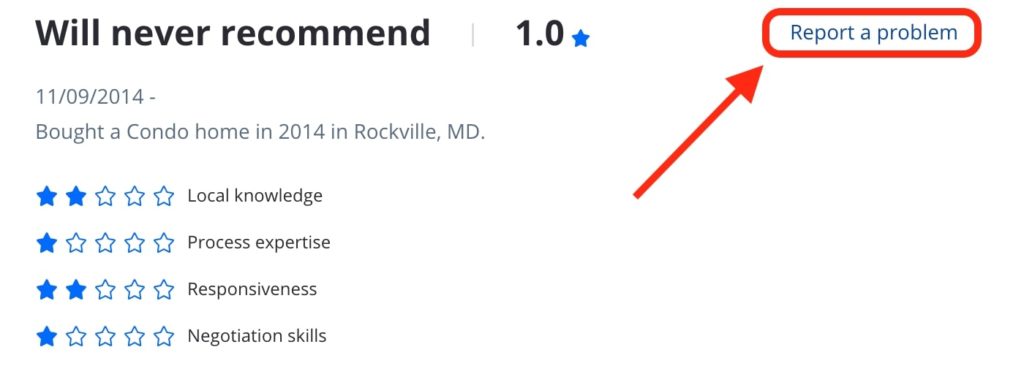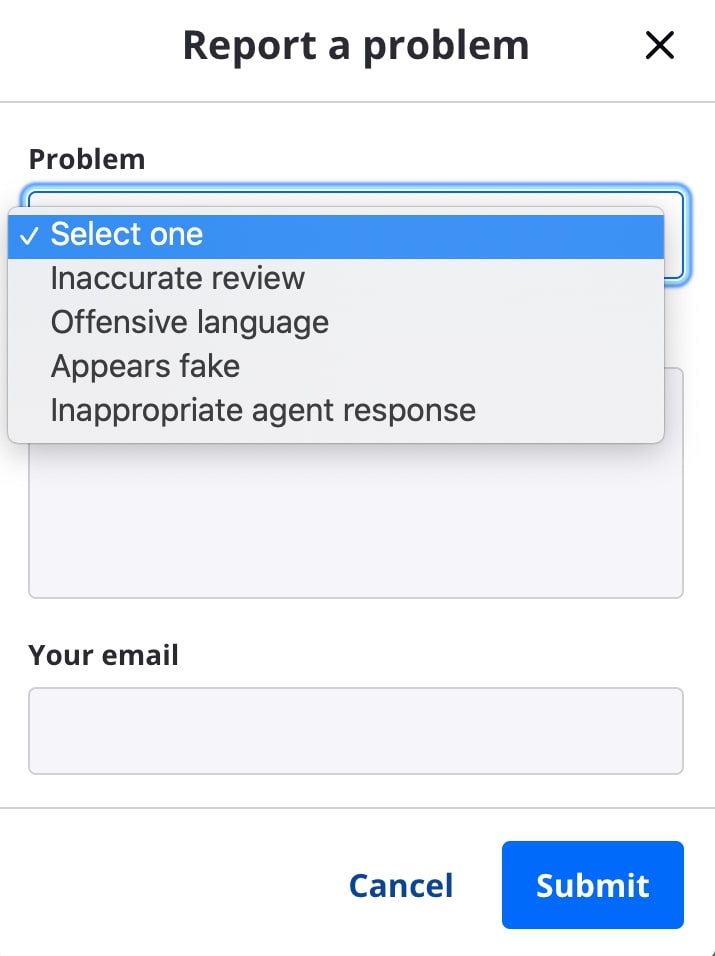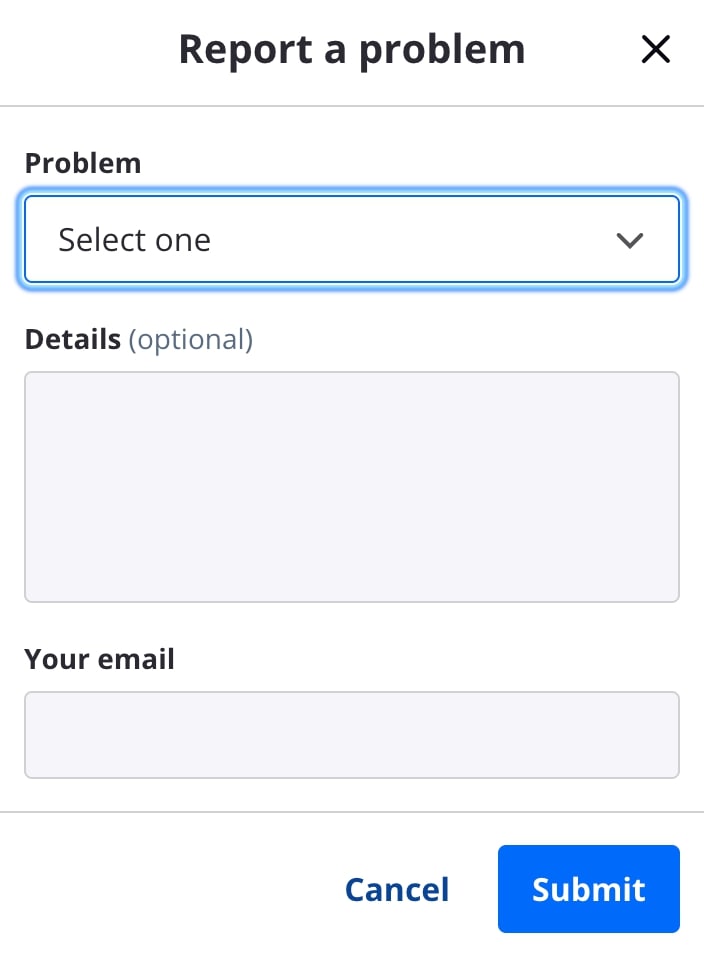
How Real Estate Brokers Can Remove Fake & Bad Zillow Reviews
This page has been peer-reviewed, fact-checked, and edited by qualified attorneys to ensure substantive accuracy and coverage.
Many home buyers and sellers turn to Zillow to seek out an experienced, highly recommended real estate agent to help them with one of the biggest transactions of their lives. So a bombardment of bad Zillow reviews can cause real reputational and professional damage—which is why it is crucial for real estate professionals to know how to remove a bad Zillow review.
Realtors and real estate agents can remove a bad Zillow review using the following methods:
- Ask the original author to remove the negative review,
- Flag the negative review to Zillow for Terms of Service (ToS) violations,
- Pursue legal action against the person who left the review, and
- Use Online Reputation Management and SEO to suppress the negative review(s).
At Minc Law, we have helped thousands of individuals and businesses, including real estate agents and agencies, remove reviews, identify anonymous reviewers, and file defamation lawsuits. It is our priority to deal with defamatory online content quickly and efficiently while drawing as little attention to the matter as possible.
In this article, we explain Zillow’s review process and when bad reviews actually constitute defamation. Then, we give several tips and tricks for dealing with negative and defamatory Zillow reviews.
Let us help you explore your legal options and craft an effective strategy.Fake reviews harming your business?
What Realtors & Premier Agents Should Know About Zillow Reviews & Its Community Guidelines
If you are looking to remove information and negative reviews from Zillow, the best place to start is by learning more about its review policies.
Zillow is a U.S.-based online real estate marketplace company that was founded in 2006 by two former Microsoft executives. Zillow emphasizes that it is the most-visited real estate website in the United States. Zillow and its affiliates offer customers an on-demand experience for selling, buying, and renting homes.
Realtors and consumers both use Zillow, where it is free to list a home or property for sale by the owner, agent (premier agent), or rental manager. Potential buyers and renters can search for a property using their website or app, compare listings, and connect with local professionals.
Zillow welcomes and encourages users to rate and review real estate professionals. As with every website online, Zillow has community guidelines of which you—as a Zillow realtor or premier agent—should be aware.
What Types of Content Will Zillow Reject & Remove From Its Platform?
According to Zillow’s review guidelines, users should not submit reviews that contain:
- Foul or inappropriate language,
- Information that is not relevant within the context of the Zillow website,
- Information that is not relevant within the context of the services provided by the professional,
- Personal attacks,
- Offensive comments, and
- Spam.
If Zillow feels that the review submission does not comply with their guidelines or policies, it will not be posted to the Zillow website. Zillow also reserves the right to withdraw submissions in which suspicious activity or a conflict of interest could be present, such as:
- Reviews from family members or employees of the same company,
- Invalid email addresses, including “disposable” addresses,
- An unusually high number of submissions by one user,
- An unusually high number of reviews for a professional, and
- Reviews from users who have received or been offered compensation for submitting a review.
Are Reviews on Zillow Anonymous?
According to Zillow, its client review system is completely anonymous. The platform uses its own method to moderate reviews and verify their authenticity.
Once a customer review is submitted, the subject of the review receives an email alert—but they will only be able to see the username of the reviewer, not their legal or real name. If the reviewer chooses to use a username that does not match their real name, determining the identity of the poster can be more difficult.
However, it is still possible to identify who posted the review with the help of an experienced internet attorney. For example, experienced defamation attorneys commonly identify anonymous posters by issuing subpoenas to the platform where the unlawful content was posted and tracking the poster’s IP data.
At Minc Law, we have found that where we have multiple data points on the anonymous poster, the information is “fresh,” and they are not an expert hacker, we can typically identify anonymous perpetrators 9 out of 10 times.
When is a Bad Zillow Review Considered Defamation?
In the United States, robust First Amendment and free speech protections empower consumers to voice their opinions and speak freely about their experiences with a business (online and off). However, when those statements about a business cross into the territory of defamation (are false), you may then legally hold someone liable for their unlawful statements.
A bad review may be considered defamatory when:
- A false statement is made,
- It is communicated to a third party,
- The reviewer acted with at least negligent intent, and
- Some harm or damage is caused to the person who is the subject of the statement.
A bad review can cross the line into defamation if a reviewer falsifies that they were a customer, or falsifies anything about their marketplace experience with your business.
What is the Difference Between Slander & Libel?
Defamation is the act of damaging someone’s good reputation. It can be broken down into two categories: slander and libel.
- Libel is defamation expressed in writing. Libel can take place online (such as on a blog or social media) or in books, police reports, text messages, emails, and any other form of written communication.
- Slander is defamation expressed verbally. Slander takes place in the spoken word, and it can take the form of rumors being spread from person to person, conversations over the phone, or any other spoken communication.
A good way to remember the difference between libel and slander is to think of a library for libel. Libel is written defamation, and there are written materials in a library—and both words start with the letter “L.” When you think of slander, think of the word spoken. Slander is spoken defamation, and both start with the letter “S.”
Because defamatory Zillow reviews are published in an online medium, they fall under the category of libel. It is critical to acquaint yourself with the difference between libel and slander as filing requirements (such as the statute of limitations) may depend on the type of defamation claim you have.
What is the Difference Between a Bad & Defamatory Zillow Review?
Just because a review is negative and causes damage to your reputation, it does not always mean the statement is defamatory. For example, there are countless defamation defenses that a defendant might rely on to avoid legal liability for their published statement(s).
Listed below are two examples clarifying the difference between a bad review (which is perfectly lawful) and a review that crosses the line into defamation.
Example of a Bad Review That Does Not Cross into Defamation
“I ordered a rug from this company and the color is not what I expected, so I am only giving them 2 stars because I feel that the photo didn’t match the product.”
If this review was left by a real customer and reflects a genuine marketplace interaction, they are well within their rights to leave a negative review based on their real experience. Also, this type of review would be considered an opinion. To be considered actionable for defamation, a statement must be a false statement of fact—not merely the speaker’s opinion.
Example of a Defamatory Zillow Review
“The owner of this establishment engaged in theft by charging $150 extra on our credit card for the meal. Do not go here or they will steal from you too!”
If the owner did not in fact charge $150 extra on the patron’s credit card, this review would be considered defamatory because the veracity of this claim is provable by fact, that the owner did not in fact steal the patron’s money.
Also, the reviewer published the defamatory statement to a third-party (an online review platform) with the intent to harm the owner/business. And lastly, the owner and business may suffer a loss in business or other damages as a result of this review (causing harm or damage to the person who is the subject of the statement).
If you are unsure if a bad review is defamatory or not (and if you can sue for a bad review), contact an experienced internet defamation attorney to discuss your rights.
When Should You Avoid Suing Someone for a Bad Review?
A review may be harmful to your business, but not every case of a negative or damaging review is appropriate to file a lawsuit over. You should avoid suing for a bad review in the following circumstances:
- If the review is factually true,
- If the review is pure opinion, and
- If doing so might draw more unwanted attention to the review.
Avoid Suing if the Review is Truthful
First, you should avoid suing someone for a bad review when the reviewer is telling the truth.
One of the key elements in a defamation claim is falsity. The plaintiff in a defamation case must prove that what was written or said is false. If the statement or review in question is true, there is no valid defamation claim at play.
There is a reason the phrase “the truth hurts” is a cliche. It is an unfortunate reality that businesses have to deal with hard truths in the form of an occasional negative review. Use the opportunity of receiving a bad, yet truthful, review as an opportunity to improve for next time!
Avoid Suing if the Review is Opinion
You should also avoid suing for a bad review when the content of the review is the writer’s opinion.
Unfortunately, the line between fact and opinion is not always clear. When a defendant shares an opinion that cannot be proven true or false, they may rely on the defense of opinion. However, a mixed statement that contains both facts and opinion might still be considered defamatory and worth bringing suit.
Avoid Suing if Doing So May Draw More Unwanted Attention to the Review
Even if the review in question is clearly defamatory, there may be other reasons not to file a defamation lawsuit. If your business is large and has hundreds or thousands of reviews, a single negative review may not be worth the time and effort of having it removed.
But if your business is small and does not have many customer reviews to begin with, a single defamatory review may do a great deal of reputational and financial harm. In that case, the benefits of instigating a lawsuit may outweigh the costs for you.
Another consideration is that in some cases, filing a defamation lawsuit may draw more unwanted attention to the matter. This social phenomenon is known as the Streisand Effect. Attempting to censor an individual’s speech can backfire if your lawsuit draws more public attention than the original statement would have garnered.
Video: What is the Streisand Effect & How Can I Avoid It?

Minc Law Defamation Lawsuit Tip: You should also be sure to consider all potential defamation defenses that may invalidate the claim before suing for defamation. Common defamation defenses include privilege, consent, statutory defenses, and an expired defamation statute of limitations.
Can You Sue Zillow For a Bad or Defamatory Review?
Simply put, you cannot generally sue Zillow for a bad or defamatory review. When a bad or defamatory review is published, your first instinct may be to file suit against the platform where the review is hosted. However, this course of action is not your best option, since most lawsuits of this nature fail.
Section 230 of the Communications Decency Act codified the broad immunity bestowed on internet service providers and websites that host third-party content, like Zillow. According to Section 230, ISPs and websites are not held liable for what their users post (unless a narrow exception applies), even if a party was harmed by the post.
Due to the broad immunity granted to ISPs under Section 230, it is generally most appropriate to sue the publisher (poster) of the defamatory Zillow review directly.
Tips For Handling Bad Reviews on Zillow
Unfortunately, bad reviews are just a part of doing business. Not all customer reviews will be positive, so there is no need to panic if you receive a bad review. Think of a bad review as an opportunity to build connections and trust with your audience.
Below, we outline the steps you can take to deal with a bad review, including when you should and should not respond—and tips on how to craft the perfect response to a negative review.
What Can You Do About a Bad Review on Zillow That Is Untrue?
If a bad review crosses the line into defamation, there are legal remedies available. Even if the review is written by a customer, they cannot fabricate stories and make up false statements about you or your business.
If you have a bad review on your hands, there are options available. Here are four ways you can attempt to remove a bad Zillow review:
1. Ask the Original Author to Remove the Negative Review
The most direct method of removing a negative Zillow review is to convince the original author to take it down. However, this method is not as simple as it appears.
If the review was left by a real client, you may be able to solve the problem by reaching out to them privately and using exemplary customer service to deal with whatever legitimate complaint they have about your business.
Keep in mind, however, that we generally do not recommend responding directly to reviews on the website where they were posted unless it is extremely serious or you have otherwise exhausted all other options to remove the review. Try your best to respond to real customers using other communication channels, such as phone, email, or direct message.
But if the review was fraudulent, you are unlikely to see success in dealing directly with the poster. Their goal is to damage your business, so it is possible that no amount of respectful communication will dissuade them.
2. Flag the Negative Review to Zillow For Terms of Service Violations
While real estate agents cannot directly delete any reviews on Zillow, they can flag the review for Terms of Service (ToS) violations to be reviewed or re-moderated by Zillow’s moderators.
After locating the review you would like to report/flag, click “Report a Problem.”

You will then need to select the reasoning for reporting the review from the dropdown menu (inaccurate review, offensive language, appears fake, inappropriate real estate agent response).

You can also provide details on why you are reporting the review (this section is optional, but strongly recommended). Lastly, you must provide an email address where you can be contacted for further information.

After you have reported the review to have it re-moderated, Zillow moderators will review it. The team will remove the review if they find that it does not meet their review guidelines. But if the moderators find that the review meets their guidelines, it will remain published on the site.
It is also important to note that real estate agents can opt out of being rated by deleting their Zillow profile altogether, including all reviews.
Keep in mind that review removals on Zillow are rare, and if you attempt removal by flagging the review and it does not get removed, you have other legal options and you should contact an experienced legal professional to discuss your options.
3. Pursue Legal Action Against the Person Who Posted the Review
Assuming that the review in question is fake and qualifies as defamation, filing a defamation lawsuit is an option to effectively remove the review.
Bringing a defamation claim against the reviewer is a serious step that should be viewed only as a last resort. Filing a defamation lawsuit may be a time-consuming, difficult, and expensive process.
But if you have exhausted all other options, pursuing litigation against a known or anonymous defamer can be an effective way to:
- Obtain a court order to have the negative review removed;
- Identify an anonymous poster behind the review (ex. filing a John Doe lawsuit);
- Read a settlement or obtain defamation damages for the harm caused;
- Achieve legal acknowledgment that your rights were violated.
Most lawsuits over fake and negative reviews are resolved without the need to go to trial.
If you decide to pursue legal action, keep in mind that there is always a chance that the lawsuit may become contentious and difficult. Because of the complex and fast-moving nature of defamation litigation, it is extremely important to work with an experienced attorney who can help you navigate the process and move quickly to obtain the necessary evidence.
4. Use Online Reputation Management & SEO Strategies to Suppress Content
In some instances, it is not feasible to remove a negative review. The best course of action in these situations may be to use online reputation management (ORM) strategies to curate your top search results and make it more likely for positive media to appear first.
ORM strategies and services typically strive to bolster one’s digital footprint by:
- Creating positive content about you such as articles, blog posts, and social media posts (Facebook, Twitter, Instagram);
- Cultivating a positive review profile and online presence,
- Monitoring social mentions and online reviews, and
- Suppressing negative content.
Additional Ways to Handle Bad Reviews on Zillow
On top of flagging the review for re-moderation, Zillow suggests these helpful tips for dealing with a negative review on their platform:
- Respond to the review publicly,
- Contact the reviewer through Zillow, and
- Make more review requests from other real estate clients (because the number of reviews can drive more contacts to real estate agents than the rating itself).
However, remember that we do not generally recommend responding publicly to reviews. If you do choose to respond, keep in mind that you should always prioritize using calm, respectful language that is not defensive and does not reveal any private information about your client.
Below, we explore instances in which a real estate agent may want to respond to a review—and when they should not respond.
When Should You Respond to Negative Reviews on Zillow?
While it may be your gut feeling to defend yourself or your business against a false or negative review, take a step back and think it over before you respond—because it may not always be the best course of action.
There are pros and cons of responding to reviews, and many reputation management professionals are split on this particular topic. Below are two lists of instances in which you should—and should not—respond to a negative review.
When You SHOULD Respond to a Negative Review
- When a customer has posted a review that is substantially true, and there has been some type of wrongdoing on your or your business’ part;
- When a customer posts a true review and it is about something of genuine concern; or
- When a customer posts a factual review, but only includes a minor complaint (in this case, keep your answer short and sweet and thank them for their feedback).
When You SHOULD NOT Respond to a Negative Review
- The customer is hostile or vicious, and you think responding may escalate the situation;
- You plan on taking legal action—in this case, defer to your attorney regarding whether or not a response is a smart move; or
- If you are a certain type of professional, like a doctor or lawyer—in this case, you could get into legal or ethical trouble by responding to reviews.
What Are Some Tips For Responding to Bad Reviews on Zillow?
Below, we list a few key tips on how to respond to bad reviews on Zillow:
Respond to the Review Within 48 Hours
If you do choose to respond to a bad review, try to respond in a timely fashion.
But if you need to take time to cool down, do it; writing a response when you are feeling heated or upset can end up escalating rather than de-escalating the situation.
Use the Customer’s Name in Your Response
If the customer has provided their name, use their name when writing your reply. This extra touch can help the customer feel personally heard.
Understand What the Customer is Saying
Be sure to respond to what the customer has actually written, not what you think they should have said or what you believe their experience was. Focus on the customer’s concerns and refrain from making excuses or becoming defensive.
Sympathize With the Customer & Genuinely Apologize
Acknowledge the customer’s experience and show that you sympathize with their negative or bad experience. Apologize for the negative experience they had, and make sure your apology is sincere.
Try to Resolve the Issue
Attempt to fix the problem by asking the customer what you can do to make it right. Another option is to invite them back to experience your services again.
Thank the Customer for Leaving the Review
Demonstrate appreciation that the customer took time out of their day to write the review on Zillow.
Keep the Response Short & Sweet
Avoid including too much information. Oversharing details about the customer’s experience may provide more opportunities for the customer to become upset and respond again.
Take the Discussion Offline
Offer to take the discussion to another, more private communication channel by providing your direct contact information.
Minc Law Tip: Responding to a negative online review is a delicate task since a bad choice of words can create more problems than it solves. For more tips on how to respond constructively to negative reviews, see our article: “How to Respond to Bad Reviews on the Internet.”
How a Legal Professional Can Help With a Defamatory Zillow Review
A negative and fake review can have devastating impacts on you and your real estate practice. Contacting a legal professional is in your best interest if you are receiving negative or defamatory client reviews on Zillow.
An experienced internet attorney has the experience and access to tools and resources necessary to help you:
- Develop strategies for a response and navigate platform reporting procedures,
- Compile evidence of the defamatory review(s) and present it to the platform,
- File a defamation lawsuit,
- Identify anonymous reviewers,
- Obtain a court order to remove content, and
- Explore alternatives to litigation.
A legal professional, such as the attorneys Minc Law, can help you determine whether the review is defamatory and if you have the option of legal recourse. Law firms with internet content removal experience can help you navigate the legal system and explore creative options when it comes to dealing with negative reviews online.
We Help REALTORS & Real Estate Brokers Remove Fake Zillow Reviews
If you are struggling with negative or defamatory reviews on Zillow, it is important to contact an internet defamation attorney to discuss your options and rights.
★★★★★
“Fast. Legit. Can’t thank Melanie enough for this service. Feel like I have my life back again. Do not hesitate if your thinking of using them.”
AI, Aug 17, 2021
At Minc Law, we are dedicated to removing false and defamatory online content. We understand and have the skillset to remove negative and fake reviews from websites like Zillow.
For help with bad Zillow reviews, contact us for an initial consultation by calling (216) 373-7706, speaking with a Chat Representative, or filling out our online contact form.




